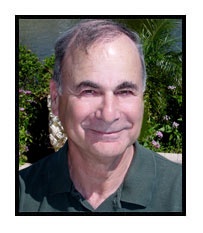
An Interview with Dick Diamond – his market of choice is the S&P 500 e-mini futures contract – for forex traders that might be analogous to EUR/USD
Richard 'Dick' Diamond has been trading the markets for over 35 years having started out on the floor of the American Stock Exchange working for his father's brokerage firm.

JP (Justin Pugsley from mahifx.com): Can you tell me about your background and what got you into trading?
DD: I had the good fortune of having a father who was successful in the businesses he took up. But he gave all of that up to focus on the stock market. He bought a seat on the New York Stock Exchange (NYSE) for about $11,000 many years ago.
I watched him and was interested in the things he said as I was growing up. I graduated from the University of Pennsylvania and the University of Michigan, I got my masters degree, and then I went into the Marine Corps (US Marines).
When I got out of the Marine Corps I didn't ask to join my dad, but he offered to let me come in as a partner. He had a free seat on the American Stock Exchange (AMEX). As he was a member of NYSE and traded there, he asked me if I would take that seat.
I said I would be very happy to do so. I worked for my dad for 5 years on AMEX. During my time there working on the floor I was enthralled by the independent brokers who weren't doing what I did, which was executing orders for my dad and his clients. It was a menial type of job.
The independent brokers were trading for their own account. So I asked my father after 2-3 years on the floor, please let me trade for the firm on a very modest basis.
My father said absolutely not. He said traders don't make money.
So after 5 years I left my father's firm and started trading for my own account on the floor. This was 1965. I did very nicely. In 1966 I did better. In 1967 it was even better and in 1968 I thought I was a genius.
But there were a couple of facts I didn't know:
I was ridding a wave of bullishness. On AMEX at the time there were cheap oil stocks and all I did was just buy them and resell them every couple of minutes. And I did very well for 4 years running.
JP: So very similar to day trading or even scalping?
DD: Yes that's correct. At the end of 1968 I went away on vacation with a ton of positions. I had some 15 positions, each was at least 10,000 shares, but they were cheap stocks, like $3-8 stocks.
While I was on vacation at the beginning of 1969 the market started to cave. I'd never seen this before and the market broke very sharply. Within 3-4 weeks I'd lost 70% of my capital.
So I sat down with my wife and we discussed whether I should stay in trading or learn to do it properly.
JP: And I guess your dad was saying: “I told you so”
DD: Yes that's right. What I did, is go to the library, found some books on technical analysis, talked to some people I trusted and found out a couple of things:
I didn't know how to trade and knew nothing about it. I just rode the trend.
I learned that you can play both sides of the market, the bullish and the bearish side. You trade long, you trade short.
Another thing I learned is that you don't trade 10,000 shares of a $4 stock, but 500 shares of an IBM type stock, you learn technical analysis and you trade where the market is telling you.
JP: So you were trading shares in companies such as IBM for the thinner spread? Greater liquidity?
DD: Yes you want movement and volatility. You want to trade the bigger priced stocks, not the junk.
I got into it on a very limited basis and started making money.
Then something else happened in my life – in 1975 the Chicago Board of Options Exchange (CBOE) came into being and you could trade options and I thought this was really for me.
That added to what I was doing and I traded a lot of options and then I think around 1980-81 there was the S&P futures. One point on the S&P 500 futures was $500, which is a lot. So I traded it in a limited way.
But something very important happened to me in 1997. The Chicago Mercantile Exchange (CME) came out with the e-mini S&P 500 contract at $50 per point. I think the e-mini is one of the greatest contracts, it's totally liquid, nobody sees your order and your orders are executed in under a second.
I've been trading it ever since.
Then starting in 2002 I started giving courses on a formal basis 3-4 times a year – 4 day courses.
My trading is all about what I call emotional discipline. You have to be able to do nothing if you don't get the proper set-up, have to sit like a cat in the bushes and wait for your set up before you pounce.
I have 4 templates I use on my computer with various technical indicators and I use a product called MetaStock.
I also use some software, which keeps track of what I'm doing and when I'm doing it and guides me on how to get in and out of trades quickly and tracks my P&L on a moment by moment basis.
I guess you've heard about the trader Richard Dennis. He wrote this article about emotional discipline. You can only make the trade when it is there to be made. You have to wait for the 80/20 trade.
JP: Can you explain what you mean by an 80/20 trade?
DD: It is a trade, which fits s perfectly with what you're doing. Along with that you have to protect yourself. I keep my stops very close and I move them in the direction of the trade (when profitable).
Not all my trades work out, but if I'm doing it properly, I'm going to be right at least 8 times out of 10. The other 2 times I'm not right could be a break-even or a small loss, because I keep my stops very tight.
JP: To get that kind of winning ratio you must be timing your entries really precisely?
DD: I'm disciplined. We show our students what we believe is an 80/20 trade. It's when certain indicators cross at a certain time.
I trade on a 2 min chart, but you can use any time frame, but on a 2-min chart I can be making 3 or 4 trades a day and it adds up to good money.
If I don't get my 80/20 trade set-up I won't trade and sometimes that happens. So I just go play golf or something, but I won't trade unless I get the set-up.
To do that you have to have the emotional discipline to sit and wait.
JP: Can you talk about some of the technical indicators you use for your trade set-ups?
DD: There are two technical indicators I use, but they are very hard to get on trading software packages.
One is called the RMO, it comes from a guy in India and MetaStock has a hold on this indicator and it's very good. (RMO was developed by Rahul Mohindar and to find out more please visit: http://www.metastock.com/products/thirdparty/?PLUG-RMOATM)
The other indicators I use are standard, such as the MACD and moving averages.
You got to catch these 80/20 trades early, if don't do that, you don't want to take it. My whole approach to trading is about being conservative. I'll take my time, I'll take small positions.
The key to what I do is to constantly not lose money and if I do then the amount is going to be small because I'm sitting and waiting for the proper trade.
JP: Do you have some advice for someone coming to trading for the first time?
DD: Be very cautious. Most people fall by the wayside in trading. A lot of them get some initial success and then get over-confident and go for broke.
Learn to trade with technical analysis, learn to do it quietly, conservatively and stay in that mode. Wait for the trade to come to you.
Don't try to trade because you need the action, it's the worse possible thing you can do. You don't need the action, you need the winning trade.
JP: Would you advise paper trading to start off with?
DD: Paper trading is fine, but the truth is you're going to have to do it for real. My advice would be to trade one contract (trade very small positions) and use tight stops. You've got to find trades that give you the best chance of winning.
JP: Emotional discipline and waiting for the right trade set-ups is probably one of the hardest things to do. Do you have any thoughts as to how people can discipline themselves to do that?
DD: It's all on you. You can be taught how to use indicators, templates and so on, but emotional discipline is something for the individual. It's just something you have to learn how to do.


